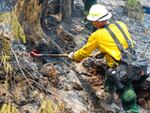
Firefighters work to mop up hot spots within the Stouts Creek Wildfire.
Courtesy of the Douglas Forest Protective Association
Ninety-seven large wildfires have burned on 1.5 million acres across Oregon and Washington this season. Of those fires, 43 were started by lightning. At least 12 were human-caused, but dozens more remain under investigation.
And some of Oregon's largest fires this year were caused by people. The Stouts Creek Fire in southern Oregon was ignited by someone mowing grass during prohibited hours. The County Line Two Fire on the Warm Springs Reservation started when a recreational vehicle towing a trailer lost a wheel, sending sparks for miles into dry grass along Highway 26. Last weekend, a 200-acre fire at Cove Palisades State Park near Culver was ignited by charcoal briquettes that weren't disposed of properly. That fire destroyed two homes.
Carol Connolly with the Northwest Interagency Coordination Center noted that human-caused fires strain firefighting resources.
"We have a limited amount of resources in our region. And that's all we have," said Connolly. "If we have new fires started that could be preventable, we're pulling those off fires that could be contained. So, it could be another situation that we don't want to be in."
Though fire danger remains high across the Northwest, it is down from last month.
With cooler temperatures and precipitation this week, fire activity has tapered off some in Oregon and Washington. The Northwest is no longer the No. 1 firefighting priority in the nation.
Connolly said that means some fire crews in Oregon and Washington could be sent elsewhere.
"We may be asked to export resources. Meaning that another geographic area may need a resource more than we do, maybe," Connolly said. "Our national center will make that decision."
The Northern Rockies region bumped up to the No. 1 priority slot for fires Tuesday. The area includes Northern Idaho, Montana and North Dakota.
Despite the cooler temperatures, Connolly said timber areas are still dry and fire danger is still high in many areas across the Northwest.